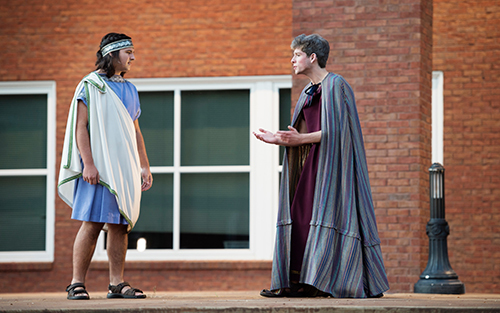Contact: Anna Owens

STARKVILLE, Miss.—Mississippi State’s Judy and Bobby Shackouls Honors College continues its annual observance of Classical Week this month, featuring a theatrical performance of Plautus’ “The Braggart Soldier,” which examines the concept of unexpected heroes who accomplish extraordinary feats.
A comedy first performed in Rome in 206 B.C., “The Braggart Soldier” is considered the greatest of Plautus’ 21 surviving works. The play follows Pleusicles, a young Athenian man who must journey to Ephesus to reclaim both his slave and his companion after they are abducted by Pyrgopolynices, an egotistical military officer and prolific liar. The plot’s true hero is an unexpected character.
Performances take place Sept. 24 and 25 at 6 p.m. in the Griffis Hall Courtyard at Zacharias Village. Donna Clevinger, professor of communication and honors college senior fellow, is director. All Shackouls Honors College students, the actors represent a variety of MSU majors.
The play will proceed rain or shine but will move to the first-floor common area of Griffis Hall in the event of inclement weather. Attendees are encouraged to bring lawn chairs or blankets for seating, as well as a picnic. Performances are free to all and open to the public.
“There’s nothing like an evening here at Mississippi State, to sit on the grass in Zacharias Village and watch a play and share that communal experience together,” said Clevinger, adding “We look to the past to find out who we are today.”
Additional events include an exhibit of Greek and Roman artifacts and a guest lecture about how history can inspire today’s heroes as part of the honors college’s “The Orators” speaking series.
“To Hellenistic and Back,” an exhibition of Greek and Roman artifacts curated by the Department of Art Galleries and the Lois Dowdle Cobb Museum of Archaeology, includes 16 pieces that tie into the theatrical performance regarding setting, clothing and props.
Free and open to all, the exhibit is located in the Brock Gallery on the main floor of Old Main Academic Center through Oct. 9. Gallery hours are 7 a.m. to 11:45 p.m. Monday through Thursday, and 7 a.m. to 7:45 p.m. on Fridays. All pieces are part of the Lois Dowdle Cobb Museum’s permanent collection.
“I hope the exhibition will inspire a deeper understanding of the time and students will question the meaning of objects they previously only researched,” said Lori Neuenfeldt, MSU art instructor and director of galleries.
Hellenism refers to the Roman Republic’s Mediterranean conquests and Greek colonization between 323 and 31 B.C. In the art world, extensive landscapes became popular subjects, fresco painting originated as a technique, and sculptures depicted average people in the midst of everyday activities, according to Neuenfeldt.
Philip Freeman, a professor of humanities and the Fletcher Jones Chair of Western Culture at Pepperdine University’s Seaver College, will discuss “Looking to the Past—To Find Today’s Heroes.” Free and open to all, Freeman’s lecture takes place Sept. 26 at 2 p.m. in Griffis Hall’s Forum Room, with a reception to follow.
Freeman also is a theatrical consultant for “The Braggart Soldier,” and he adapted the script translations specifically for the Classical Week performances.
For more information about “The Braggart Soldier” or “The Orators” lecture series, contact Clevinger at 662-325-2522 or dclevinger@honors.msstate.edu. For more about “To Hellenistic and Back,” contact Neuenfeldt at 662-325-2970 or lneuenfeldt@caad.msstate.edu.
MSU is Mississippi’s leading university, available online at www.msstate.edu.